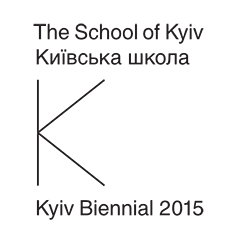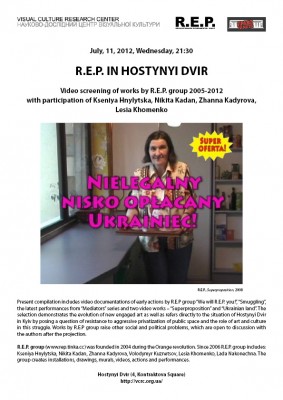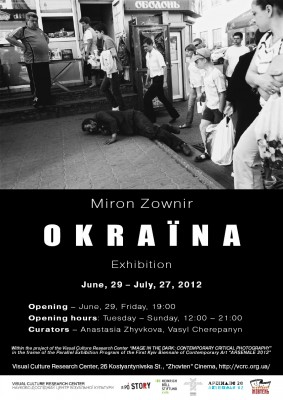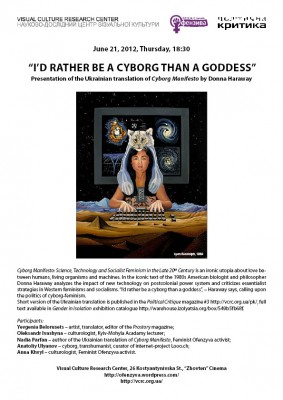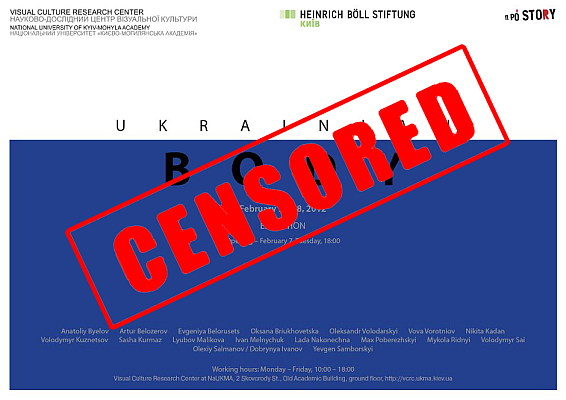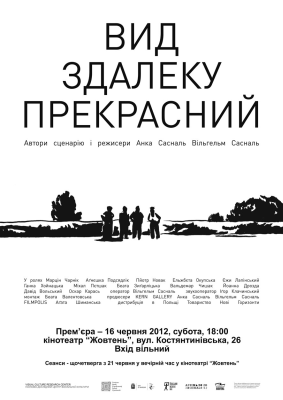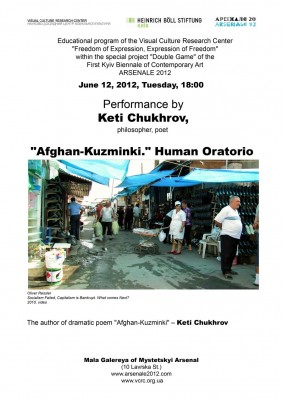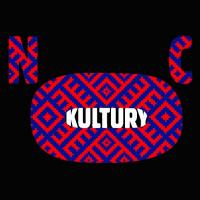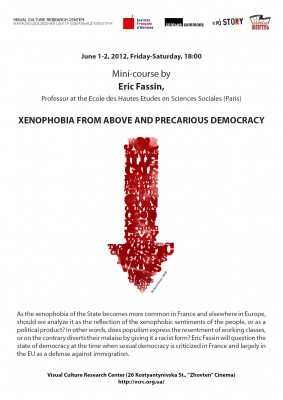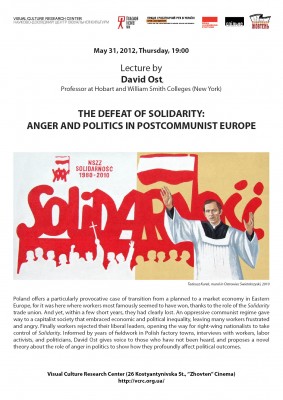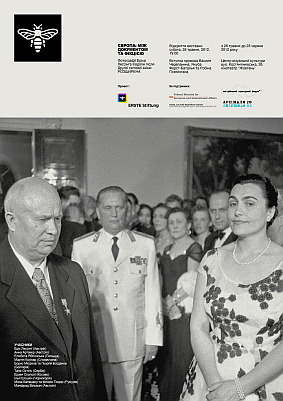R.E.P. IN HOSTYNYI DVIR
R.E.P. group, Visual Culture Research Center, Right to the City group
July, 11, 2012, Wednesday, 21:30
Video screening of works by R.E.P. group 2005-2012 with participation of Kseniya Hnylytska, Nikita Kadan, Zhanna Kadyrova, Lesia Khomenko
Present compilation includes video documentations of early actions by R.E.P group “Wе will R.E.P. you!”, “Smuggling”, the latest performances from “Mediators” series and two video works – “Superproposition” and “Ukrainian land”. The selection demonstrates the evolution of new engaged art as well as refers directly to the situation of Hostynyi Dvir in Kyiv by posing a question of resistance to aggressive privatization of public space and the role of art and culture in this struggle. Works by R.E.P group raise other social and political problems, which are open to discussion with the authors after the projection.
R.E.P. group (www.rep.tinka.cc) was founded in 2004 during the Orange revolution. Since 2006 R.E.P. group includes: Kseniya Hnylytska, Nikita Kadan, Zhanna Kadyrova, Volodymyr Kuznetsov, Lesia Khomenko, Lada Nakonechna. The group creates installations, drawings, murals, videos, actions and performances.
“Wе will R.E.P. you!” (2005) R.E.P. artists intervened on the territory of collision of communist and nationalist manifestations. The artists presented themselves as an independent political organization. The action led to a conflict between artists and nationalists.
“Ukrainian land” (2010) is a short film showing romantic Ukrainian landscapes accompanied with pathetic music turns into advertisement of the land.
The action “Smuggling” (2007) took place on the checkpoint of the Ukrainian-Polish border. R.E.P. carried Russian petrol in rubber hot-water bottles under their clothes and Russian gas in balloons. The artists also filmed the everyday life of Ukrainian petty smugglers who bind cartons of cigarettes and rubber bottles with vodka to their bodies by sticky tape to carry it into Poland through the border.
Two short films “Superproposition” (2008) are made in the conventions of advertisement genre. The advert aims at potential Polish employers by praising the qualities of illegal Ukrainian workers (low price, absence of rights protection, absence of insurance).With support of F.A.I.T. Foundation, Krakow, Zacheta Narodowa Galeria Sztuki, Warsaw (Poland).
Performance “Yodler” (2011) is from the “Mediators” series. Mediators are the folk musicians who belong to different regional and national traditions of traveling singers (including Ukrainian Lirnyk, Armenian Ashug, Kazakh Akin, Polish Pesniar and others). Invited by REP group they are performing in their own way in the streets songs on topics related to contemporary art. In the Austrian city Schwaz Tyrolean Yodlers sing about numerous cases of censorship of contemporary art, trials against the artists and pogroms of the exhibitions.
Hostynyi Dvir (4, Kontraktova Square)
Exhibition by Miron Zownir «ОКРАЇНА / OKRAЇNA»
June, 29 – July, 27, 2012
Opening – June, 29, Friday, 19:00
Visual Culture Research Center (26 Kostyantynivska St., “Zhovten” Cinema)
Having visited his historical homeland Ukraine in summer 2011 famous German photographer Miron Zownir began to work on a new photo series. Exactly one year later, when attention of the whole Europe is focused on Ukraine and Poland, Zownir represents his newest photo-project from Kyiv, Lodz, Moscow and Warsaw called «Okraїna» in the Visual Culture Research Center. Life of urban outcasts in these cities has its own laws. The boundaries that define their everyday life, outlined by poverty and social exclusion, are not less firm and restrictive than the geographical ones. East-European space is characterized by unanimity determined by invisible, unwanted fringes – citizens of outskirts. «Okraїna» by Miron Zownir is an aesthetic paradigm. It combines dark expressionism, urban landscape and iconic images of outcasts of the 21century.
Miron Zownir is a photographer, filmmaker, author of criminal novels, professor at the Academy of Film and Television in Berlin. His photo-books are published in one of the best art-publishing houses Gestalten, his works are exhibited in the most influential galleries alongside such stars as Nobuyoshi Araki, Nan Goldin, Robert Mapplethorpe, Weegee, having influenced with their documentary value the whole generation of young artists. Zownir lived in Berlin, London, New York, Los Angeles, and managed to capture counterculture punk energy of the 1980-2000’s. Heroes of his uncompromising works are homeless, outsiders, intellectuals, the main themes – man lost in the modern city, loneliness, affect, fear, deviation, sexuality. As a filmmaker since 1986 Zownir created 10 short films, worked with directors such as Alexander Rockwell, Ryu Murakami and Chosei Funahara, as well as one full-length film that in 2003 participated in Berlin Film Festival program.
In June 2011 Visual Culture Research Center presented Zownir’s retrospective, which included photographs from 1980-2000’s, along with a series of short films. «Prostory» magazine published a selection of his photographs and texts.
Curators – Anastasia Zhyvkova, Vasyl Cherepanyn
Opening hours: Tuesday – Sunday, 12:00 – 21:00
Contacts: Anastasia Zhyvkova +38 093 477 72 72, tasyona@gmail.com; Vasyl Cherepanyn +38 050 445 76 08, cherepanyn@gmail.com
Within the project of the Visual Culture Research Center “IMAGE IN THE DARK: CONTEMPORARY CRITICAL PHOTOGRAPHY” in the frame of the Parallel Exhibition Program of the First Kyiv Biennale of Contemporary Art “ARSENALE 2012”
“I’d rather be a cyborg than a goddess”
Presentation of the Ukrainian translation of Cyborg Manifesto by Donna Haraway
June 21, 2012, Thursday, 18:30
Cyborg Manifesto: Science, Technology and Socialist Feminism in the Late 20th Century is an ironic utopia about love between humans, living organisms and machines. In the iconic text of the 1980s American biologist and philosopher Donna Haraway analyzes the impact of new technology on postcolonial power system and criticizes essentialist strategies in Western feminisms and socialisms. “I’d rather be a cyborg than a goddess”, – Haraway says, calling upon the politics of cyborg-feminism.
Short version of the Ukrainian translation is published in the Political Critique magazine #3 http://vcrc.org.ua/pk/, full text available in Gender in Isolation exhibition catalogue http://warehouse.izolyatsia.org/box/549b5fb68f.
Participants:
Yevgenia Belorusets – artist, translator, editor of the Prostory magazine;
Oleksandr Ivashyna – culturologist, Kyiv-Mohyla Acadamy lecturer;
Nadia Parfan – author of the Ukrainian translation of Cyborg Manifesto, Feminist Ofenzyva activist;
Anatoliy Ulyanov – cyborg, transhumanist, curator of internet-project Looo.ch;
Anna Khvyl – culturologist, Feminist Ofenzyva activist.
Moderator – Yelyzaveta Babenko, culturologist, Feminist Ofenzyva activist.
Visual Culture Research Center, 26 Kostyantynivska St., “Zhovten” Cinema
UKRAINIAN BODY: ART / KNOWLEDGE / POLITICS INTERACTIONS
Presentation by Vasyl Cherepanyn
June 18, 2012, Monday, 17:30
In the presentation cultural and political context in Ukraine after closing of the “Ukrainian Body” exhibition in the Visual Culture Research Center is analyzed. The act of censorship drew a wide response in the Ukrainian and foreign media. The aggression against socially engaged contemporary art and the institution that represents it showed the extreme right reaction to the politicizing of sexuality. Artistic, social and political antagonisms, which showed up, are demonstrated through the optics of an engaged cultural institution and art that became a political subject.
Vasyl Cherepanyn – Head of the Visual Culture Research Center, Cultural Studies Department of the National University of Kyiv-Mohyla Academy, editor of the “Political Critique” magazine (Ukrainian edition).
Centre for Contemporary Art Ujazdowski Castle
2 Jazdów St., Warsaw
http://csw.art.pl/
http://vcrc.org.ua/
Premiera filmu Anki Sasnal i Wilhelma Sasnala “Z daleka widok jest piękny” (Polska)
Centrum Badań nad Kulturą Wizualną, Kino Żowteń, Centrum Sztuki Współczesnej Zamek Ujazdowski, Mystecki Arsenał, Biuro kultury m. st. Warszawy oraz Instytut Polski w Kijowie zapraszają na premierę filmu Anki Sasnal i Wilhelma Sasnala “Z daleka widok jest piękny” (Polska), która odbędzie się w sobotę 16 czerwca 2012 r. o godzienie 18:00 w kinie Żowteń (ul. Kostiantyniwska, 26)
Wstęp wolny
Rozgrywający się na ustronnej polskiej wsi dramat “Z daleka widok jest piękny” opowiada historię miłosną złomiarza i dziewczyny. Mozolne życie pary i mieszkańców upływa w atmosferze wszechobecnej tajemnicy. Pewnego dnia złomiarz znika, a jego odejście uruchamia bieg nieoczekiwanych zdarzeń. Pośród pięknych krajobrazów, pod palącym słońcem wypływa ludzkie zło.
Pokazy – w czwartki od 21 czerwca wieczorem w kinie Żowteń.
Prezentacja filmu w ramach polsko–ukraińskiego Projektu Specjalnego “Podwójna Gra” I. Międzynarodowego Biennale Sztuki Współczesnej
ARSENALE 2012 w Kijowie.
http://www.itlooksprettyfromadistance.com/
Performance by Keti Chukhrov “Afghan-Kuzminki”. Human Oratorio
On Tuesday, June 12, 2012 at 18:00 in the Small Gallery of Mystetskyi Arsenal (10 Lavrska St.), a series of cultural and educational events of the Visual Culture Research Center “Freedom of Expression, Expression of Freedom” starts within the special project “Double Game” of the First Kyiv International Biennale of Contemporary Art “ARSENALE 2012”.
Program’s first event features Keti Chukhrov, Russian philosopher and poet who will present her performance “Afghan”-Kuzminki”. Human Oratorio. The performance will be followed by a discussion with participation of the gender theorist Olga Plakhotnik.
“Afghan”-Kuzminki”, which is the name of a consumer goods marketplace in Moscow, is a poetic oratorio about present gender, sexual and economic politics. Performed by the author in the manner of melodeclamation and accompanied with her own music, the social and political poem raises urgent issues of patriarchal and capitalist relations in modern Russia. These relations are determined by gender inequality, fixation of sexual identity and its key role in dominant market conditions, as well as by merchandising and commodity value of the feminine body. Scenes of merchants’ lives in the marketplace discursively demonstrate models of exploitation and patriarchal violence now encountered by majority of post-Soviet people.
Keti Chukhrov’s performance follows conceptually a feminist program of “Woman’s Workshop” art association, the conference “Feminism: Assemblage Point”, and presentation of the third issue of “Political Critique” under the title “Sex and Politics”.
Musical accompaniment is the classical music of G. F. Handel, J.-F. Rameau, and G. Dowland.
Keti Chukhrov is a philosopher and poet, she teaches at the History of Art Faculty of the Russian State University for the Humanities (Moscow, Russia). She is an editorial board member of “The Art Magazine” and the author of books and collectors of poems “To Be and To Perform. The Project of Theatre in Philosophical Art Critique”,“War of Quantities”, “Just People”.
Olha Plakhotnik is a gender and feminist theorist, Karazin Kharkiv National University.
Moderator of the discussion is Yelyzaveta Babenko, cultural theorist, activist of the Visual Culture Research Centre and Feminist Ofenzyva.
More about the project: http://www.artukraine.com.ua/articles/870.html
Partners: The First Kyiv International Biennale of Contemporary Art “ARSENALE 2012”, Heinrich Böll Foundation.
Detailed information available at the following websites: http://vcrc.org.ua/en, http://arsenale2012.com/program/special/, http://ofenzyva.wordpress.com
Contact: Yelyzaveta Babenko +38 093 021 17 53, liza.babenko@gmail.com
DEBATA “UKRAIŃSKIE CIAŁO – SZTUKA I POLITYKA”
W ramach festywalu “Noc Kultury w Lublinie”
2 czerwca 2012, sobota, 18:00
Projekt przybliża i objaśnia sytuację twórców i ludzi kultury na Ukrainie. Na przedsięwzięcie składa się prezentacja dokumentacji z wystawy “Ukraińskie ciało” z 2012 roku, którą zorganizowało Centrum Badań nad Kulturą Wizualną przy Akademii Kijowsko-Mohylańskiej. Wystawę uznano za nieodpowiednią oraz prowokacyjną i decyzją rektora zamknięto. Przypadek ten będzie tłem dyskusji z udziałem obserwatorów, znawców mediów ukraińskich, twórców na temat swobód artystycznych i cenzury na Ukrainie:
Oksana Briuchowecka – artystka, kuratorka wystawy “Ukraińskie ciało”,
Łesia Kułczynska – Instytut Sztuki, Narodowa Akademia Nauk Ukrainy, kuratorka wystawy “Ukraińskie ciało”,
Wasyl Czerepanyn – dyrektor Centrum Badań nad Kulturą Wizualną, redaktor ukraińskiej edycji pisma “Krytyka Polityczna”,
Paweł Pieniążek – publicysta, tłumacz, redaktor serwisu rosyjskiego i ukraińskiego w “Krytyce Politycznej”.
Spotkanie poprowadzi Rafał Czekaj – filozof, adiunkt w Zakładzie Estetyki Uniwersytetu Marii Curie-Skłodowskiej, Lubelski Klub “Krytyki Politycznej”.
Ośrodek “Brama Grodzka – Teatr NN”
ul. Grodzka 21, Lublin
XENOPHOBIA FROM ABOVE AND PRECARIOUS DEMOCRACY
Mini-course by Eric Fassin, Professor at the Ecole des Hautes Etudes en Sciences Sociales (Paris)
June 1-2, 2012, Friday-Saturday, 18:00
As the xenophobia of the State becomes more common in France and elsewhere in Europe, should we analyze it as the reflection of the xenophobic sentiments of the people, or as a political product? In other words, does populism express the resentment of working classes, or on the contrary diverts their malaise by giving it a racist form? Eric Fassin will question the state of democracy at the time when sexual democracy is criticized in France and largely in the EU as a defense against immigration.
THE DEFEAT OF SOLIDARITY: ANGER AND POLITICS IN POSTCOMMUNIST EUROPE
Lecture by David Ost, Professor at Hobart and William Smith Colleges (New York)
May 31, 2012, Thursday, 19:00
Poland offers a particularly provocative case of transition from a planned to a market economy in Eastern Europe, for it was here where workers most famously seemed to have won, thanks to the role of the Solidarity trade union. And yet, within a few short years, they had clearly lost. An oppressive communist regime gave way to a capitalist society that embraced economic and political inequality, leaving many workers frustrated and angry. Finally workers rejected their liberal leaders, opening the way for right-wing nationalists to take control of Solidarity. Informed by years of fieldwork in Polish factory towns, interviews with workers, labor activists, and politicians, David Ost gives voice to those who have not been heard, and proposes a novel theory about the role of anger in politics to show how they profoundly affect political outcomes
EUROPE: IN BETWEEN DOCUMENT AND FICTION
Erich Lessing’s photographs from Post-World War II Europe EXPANDED
May 26 – June 23
Opening of the exhibition: Saturday, May 26, 2012, 7 pm
Visual Culture Research Center
26 Kostyantynivska St., “Zhovten” Cinema
The basis for the project is the photography of Erich Lessing, one of Austria’s most renowned photographers and a member of the prestigious photo agency Magnum Photos, who has chronicled the world and interpreted its people, events, issues and personalities. The researches and documents the culture of Central and South Eastern Europe, thereby promoting knowledge and understanding of that region. The curators Marina Gržinić and Walter Seidl were invited to select artists from the respective countries who would react to Lessing’s photographs and create parallel histories, histories which conceptually reflect the social, political and historical changes in the region with and through the medium of photography.
ARTISTS
Erich Lessing (A)
Anna Artaker (A)
Elżbieta Jabłońska (PL)
Šejla Kamerić (BiH)
Martin Kollár (SK)
Boris Missirkov & Georgi Bogdanov (BG)
Tanja Ostojić (SRB)
Erzen Shkololli (KOS)
Ilija Šoškić (MNE)
Mona Vatamanu & Florin Tudor (RO)
Manfred Willmann (A)
Curators: Marina Gržinić and Walter Seidl
A project by Erste Foundation, Vienna, supported by the Austrian Federal Ministry for European and International Affairs and the Austrian Cultural Forum Kyiv
Opening speeches by Vasyl Cherepanyn, Jakub Forst-Battaglia and Robin Gosejohann
Exhibition: May 26, 2012 to June 23, 2012
A comprehensive catalogue of the exhibition will be available with essays by Rozalinda Borcilă, Cristian Nae, Marina Gržinić and Walter Seidl.
Within the exhibition project of the Visual Culture Research Center “Image in the Dark: Contemporary Critical Photography” in the frame of the Parallel Exhibition Program of the First Kyiv Biennale of Contemporary Art “ARSENALE 2012”

